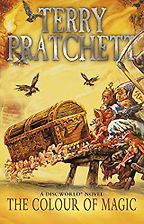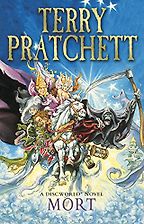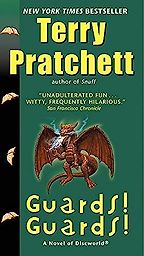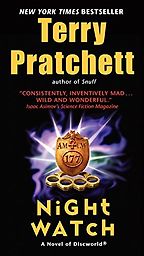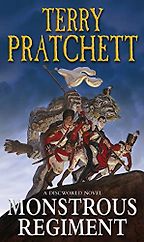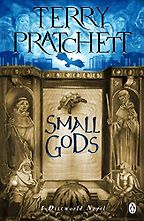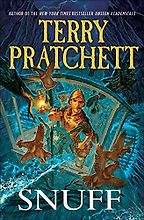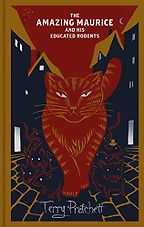Best Discworld Series Books
Last updated: November 19, 2024
Discworld is a series of 41 books written by British fantasy author Terry Pratchett and published between 1983 and 2015. According to Pratchett fan Cory Doctorow, the Canadian author and activist, they got better over time: "Pratchett’s early novels, including his early Discworld novels, are merely okay, and his later novels are great."
Below are all the novels from the series that have been recommended on Five Books. In terms of reading order, Pratchett biographer Marc Burrows recommends not starting at the beginning, but with the fourth book in the series, Mort. "Between book four and book 20, you can pick up pretty much any of them at random and they will all work...If you really want the experience of watching him develop, I’d say: start with Mort and read in publication order after that." By book 20, knowledge of prior books is assumed, though Burrows also recommends a standalone novel in the series, Monstrous Regiment.
“The Colour of Magic—the first Discworld book but actually his fourth book—hasn’t aged spectacularly. It’s a novel that needs a certain amount of context to understand the jokes about nerdy 1970s fantasy. But the book still works because the main character, Rincewind, is brilliant and is still a completely relatable character. He’s somebody who is frustrated by the sheer unfairness of the universe, and that’s something I think most people have felt at some time. Every Pratchett book has something like that: something that links it to the human experience…Because Pratchett was so astonishingly prolific (publishing two books a year, for much of his life) he got so much better as time went on. The more you do something, the better you get, right? By the time he wrote Mort in 1987, he was ten times the writer he was when he wrote The Colour of Magic in 1983. So, once you’re a fan, go back and read the first three books later.” Read more...
The Best Terry Pratchett Books
Marc Burrows, Biographer
“Mort is the first book that Terry Pratchett wrote that is entirely about Death, who is by far my favourite character – and many other people’s favourite character – in the Discworld series. It’s about Death taking a holiday and bringing on an apprentice named Mort, which is short for Mortimer, to take over for him. It’s split into two parts: one where Mort is bumbling around and learning to become Death, messing things up apocalyptically; and one where Death is spending some time thinking about life and death in a way that’s sort of philosophical. And like all of Pratchett’s stuff, it’s very, very funny, but it also feels like one of his deeper books.” Read more...
Travis Baldree, Novelist
“Terry Pratchett is – or was, I have to say, unfortunately – he was one of the most dynamic and beautiful writers I have ever read. Earlier I talked about turn of phrase: nobody, absolutely nobody, can play with words like Terry Pratchett.” Read more...
T.J. Klune, Novelist
“This book is Pratchett at his best, for me. It’s a really solid thriller. What he does with the Vimes character is that he makes a policeman: just any copper. He’s a copper who thinks like a copper. He doesn’t trust clues. And because it’s the Discworld, he’s a copper who knows his frame of reference: he knows about Raymond Chandler, he knows about Poirot. He’s the type of character who’s constantly winking at the genre that he’s also a part of. Somehow, despite all that winking, he’s an actual brilliant character, who solves the mystery by being dogged, in the same way that Marlowe does, but has Sherlock Holmes-like abilities of deduction. He can also sit down and ponder things through like Poirot. So he’s got elements of all the best detectives. But then, it’s a fantasy. It’s also a time travel book. And Pratchett does all these things brilliantly. He gives you everything you’d want from a time travel book – like, he goes back in time and intersects with a younger version of himself, who he has to train up to be the man he’s going to become.” Read more...
Stuart Turton, Novelist
“Monstrous Regiment is a standalone Discworld book. It’s a dark book. It kind of comes out of nowhere. It doesn’t really fit with any of the other Discworld books, although there are a couple of recurring characters that pop in. But you see them from another angle, as you are viewing them through the eyes of different characters. I think it could easily have been that book set during the Napoleonic Wars. It has those big hats, red hats on the battlefield. And although there is some really funny stuff in it—war movie cliches and Apocalypse Now references—it’s probably the least funny of his books, and the most serious. It’s really good, and it’s another one that I return to again and again.” Read more...
The Best Terry Pratchett Books
Marc Burrows, Biographer
“In Discworld, Pratchett has set up a world where the power of faith is something that humans have but don’t fully understand, and it can literally create things. So the gods in Discworld are a function of the strength of the belief of their followers. This is a beautiful, crazy concept, and Discworld is full of these beautiful, crazy concepts. And yet, it’s not that farfetched, because when you have a particular format in which you squeeze your idea of deity, the larger the church or the religion, the more you are able to continue to perpetuate and enforce it. So it’s not coming out of nowhere.” Read more...
The Best Speculative Fiction About Gods and Godlike Beings
Karen Lord, Novelist
“Most people will have heard of Discworld. There are 41 books in the series. Pratchett was an amazing and prolific writer…Snuff is one of those great ones, and it stands alone quite well. It is a cozy murder mystery set in a stately manor in the equivalent of the English countryside—a place called The Shire, in which the local magistrates are the great and the good, and in which they are all complicit in a murder…The hero of this book is Sam Vimes. He’s one of the most important heroes of the Pratchett canon. He’s a cop and he’s on vacation. A delightful trope of the police procedural is the cop on vacation who stumbles upon a murder, and this novel has some of the best little tasty elements of that. His loving and quite well-drawn wife, Sybil, has told him he’s overworked and has conspired with his colleagues and his boss (who’s effectively the dictator of the city for which he is chief of police) to force him to go on vacation. Of course, Vimes immediately literally stumbles upon a murder.” Read more...
Cory Doctorow, Novelist
The Amazing Maurice and his Educated Rodents
by Terry Pratchett
Discworld Series Book 28
🏆 Winner of the 2001 Carnegie Medal
“The Amazing Maurice is a retelling of ‘The Pied Piper.’ In The Amazing Maurice, the rats can talk, they’re intelligent. It’s all a scam: they come in, the rats take over, then the kid comes in and offers to get rid of them. And because the rats are in on it, they follow the kid out. It’s beautifully put together. Pratchett described it himself as the story based on the novel concept that people can talk out their problems. I love that! It doesn’t always have to be the big heroic battle at the end.” Read more...
Fantasy Books Based on Fairy Tales
Ursula Vernon, Novelist
